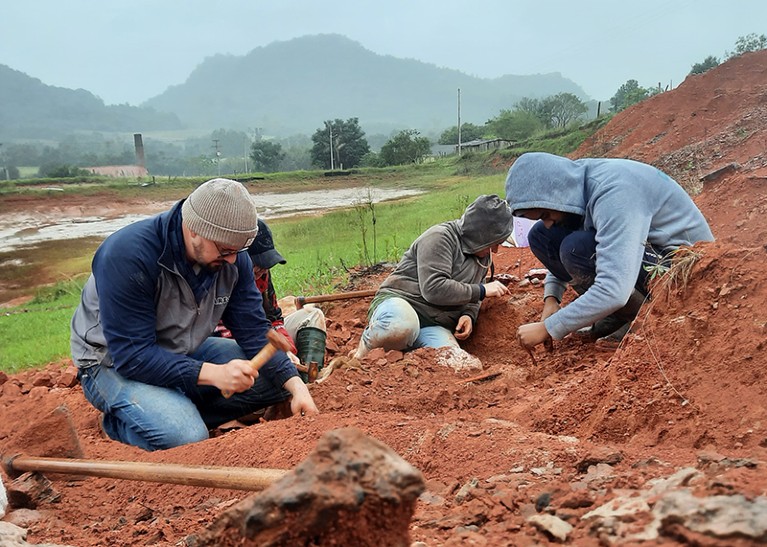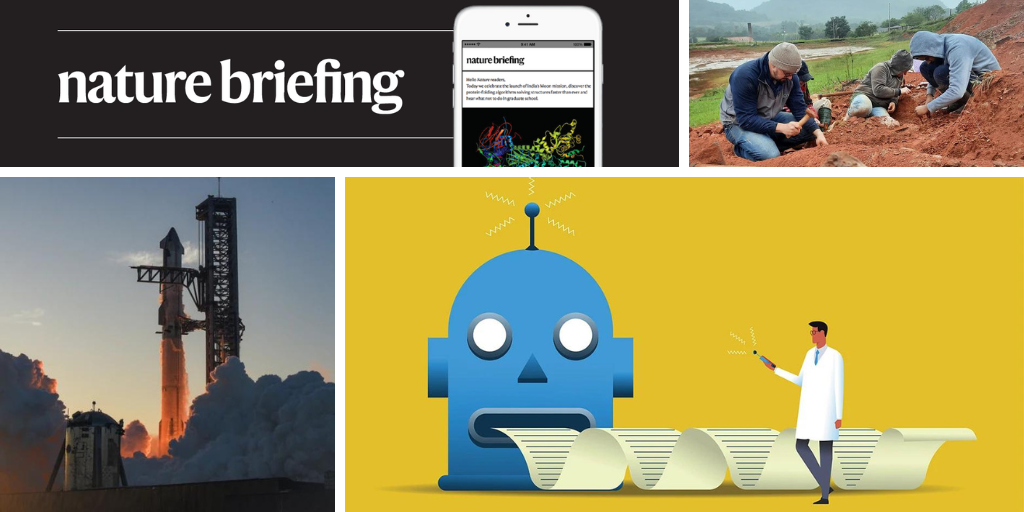Hello Nature readers, would you like to get this Briefing in your inbox free every day? Sign up here.

A research team at the Quarta Colônia Palaeontological Research Support Centre in southern Brazil excavates a fossil site.Credit: Janaína Brand Dillmann
In May, devastating floods in the state of Rio Grande do Sul uncovered pieces of bone from at least 35 ancient animals, including a 233-million-year-old skeleton that is among the oldest dinosaur fossils in the world. But intermittent rain showers and wet conditions since then have researchers racing to recover other smaller, more-vulnerable specimens that are also precious. The next challenge palaeontologists will face is what to do with all the fossils they’re recovering.
Machine-learning researchers have developed an ‘AI scientist’ that can perform the full cycle of research, from reading the existing literature on a problem and formulating hypotheses, to trying out solutions, writing a paper, and evaluating its own results. The output is not earth-shattering: the system can only do research in the field of machine learning, and it can’t do laboratory work. But the results feed into a debate amongst researchers about how AI fits into their work, says computational social scientist Jevin West. “It does force us to think [about] what is science in the twenty-first century — what it could be, what it is, what it is not.”
Reference: arXiv preprint (not peer reviewed)
The explosion and subsequent self-destruction of SpaceX’s Starship mega-rocket last year blew one of the biggest ‘holes’ ever detected in the ionosphere, a layer of thin air in the upper atmosphere. The hole stretched for thousands of kilometres and persisted for nearly an hour. The extent of the disturbance was surprising, says atmospheric physicist Yury Yasyukevich, who co-authored a study on the breach. “It means we don’t understand processes which take place in the atmosphere.”
Features & opinion
A discussion with a friend and research participant member of the Hadza people — a hunter-gatherer society in Tanzania — opened the eyes of anthropologist Alyssa Crittenden to some of the ethical concerns surrounding microbiome research with Indigenous communities. “She said, ‘I’m tired of giving parts of my body away’,” says Crittenden. The conversation helped Crittenden appreciate the impact of building her own career “on collecting samples, and indeed taking part of my research participants’ bodies.” Some Indigenous and non-Indigenous researchers are now working to draw up ethical frameworks for such research. “When you know better, you do better,” she says, referencing a quote from US author and civil-rights activist Maya Angelou.
This article is part of Nature Outlook: The human microbiome, an editorially independent supplement produced with financial support from Yakult.
“You don’t often see [these authors] on the same paper so when I do, you better believe it’s #1 on the reading list,” posted endocrinologist Beverly Tchang about an authoritative perspective on the causes of obesity written by leading experts who sometimes disagree heartily. The experts put aside their differences at a workshop in Copenhagen and collaborated on a review of what we know, what we don’t know and how scientists can find a way forward.
Nature Metabolism | 29 min read
Mallorca is believed to be among the last Mediterranean islands to be settled by humans — but an ancient stone bridge in a flooded cave calls that timeline into question. By dating mineral deposits in the cave, scientists suggest that people reached the island at least 5,600 years ago — some 1,000 years earlier than previously thought.
Reference: Communications Earth & Environment paper
On Friday, Leif Penguinson was investigating the basalt columns of Rochester Falls, in Mauritius. Did you find the penguin? When you’re ready, here’s the answer.
Thanks for reading,
Flora Graham, senior editor, Nature Briefing
Want more? Sign up to our other free Nature Briefing newsletters:
• Nature Briefing: Microbiology — the most abundant living entities on our planet — microorganisms — and the role they play in health, the environment and food systems.
• Nature Briefing: Anthropocene — climate change, biodiversity, sustainability and geoengineering
• Nature Briefing: AI & Robotics — 100% written by humans, of course
• Nature Briefing: Cancer — a weekly newsletter written with cancer researchers in mind
• Nature Briefing: Translational Research — covers biotechnology, drug discovery and pharma


